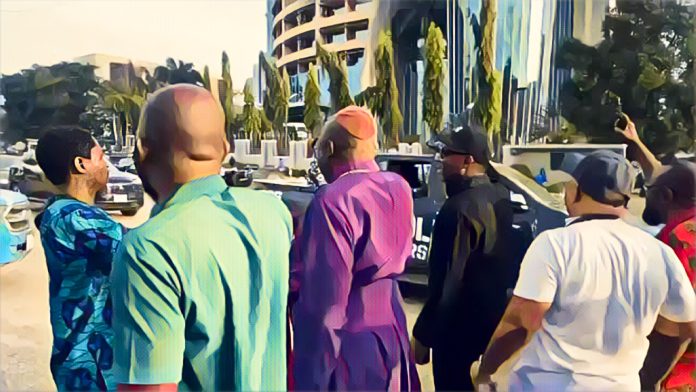Key Points
-
Tear gas and arrests as #FreeNnamdiKanu protest locks down Abuja.
-
Journalists assaulted as NUJ and Amnesty condemn police response.
-
Security lockdown causes traffic chaos across the city.
The Federal Capital Territory came to a standstill Monday after police fired tear gas to disperse protesters demanding the release of Nnamdi Kanu, leader of the Indigenous People of Biafra (IPOB).
The protest, led by activist Omoyele Sowore under the #FreeNnamdiKanuNow campaign, started peacefully near the Nigerian Communications Commission in Maitama. But it soon turned chaotic.
Witnesses said security operatives blocked roads to Aso Rock, the National Assembly, and the Federal Secretariat before dawn.
The blockade caused long traffic jams that trapped workers and residents for hours.
Kanu’s lawyer, Aloy Ejimakor, and his younger brother, Fineboy Kanu, were arrested during the protest.
Sowore escaped after police fired tear gas and warning shots to scatter the crowd.
Residents stranded as roads locked down
The lockdown frustrated many residents. People coming from Nyanya, Karu, Mararaba, and Kubwa spent hours in traffic.
Along the Nyanya-Mararaba and Dutse-Bwari routes, commuters moved slowly as police and soldiers manned checkpoints.
At the Aso Villa area, officers from the police, army, and DSS sealed off roads and conducted stop-and-search operations. Even workers with valid entry tags were turned back.
A civil servant wrote online, “All roads are blocked. Nobody is allowed in, even with tags.”
Because of the blockade, traffic spread across other parts of the city. Diversions were set up for travelers from the airport toward the Central Business District.
Security also remained tight around Eagle Square and the National Assembly.
Journalists attacked as NUJ condemns police
Some journalists covering the protest were attacked. AFP reporter John Okunyomih and BusinessDay correspondent Tony Ailemen had their equipment damaged.
The FCT council of the Nigeria Union of Journalists (NUJ) condemned the assault. The group called it a “gross violation of press freedom” and demanded punishment for the officers involved.
NUJ secretary Jide Oyekunle said journalists were “partners in nation-building, not enemies of the state.” He urged the police to end their “brutal treatment” of the press.
Protests spark nationwide reactions
In Akure, Ondo State, Igbo traders shut their shops in solidarity with Kanu. They said the move was a show of support for their kinsman.
The Igbo Women Assembly also condemned the arrests. National President Lolo Nneka Chimezie called the police action “impunity taken too far.” She demanded the immediate release of all protesters.
Meanwhile, presidential aides Bayo Onanuga and Sunday Dare criticized Kanu’s lawyer for joining the protest.
They called his action unethical since Kanu’s case is still before the court. Onanuga even urged the Nigerian Bar Association to sanction Ejimakor.
Amnesty International Nigeria also condemned the heavy-handed response. The group warned that any attempt to suppress peaceful protest “violates both national and international law.”
Police defend use of tear gas
Police spokesman Benjamin Hundeyin defended the operation. He said officers acted under a court order restricting protests around key government areas.
On X (formerly Twitter), he wrote, “Police fired tear gas at protesters trying to approach Aso Villa in violation of a court order. We didn’t block the road. We only cleared it after they obstructed traffic.”



